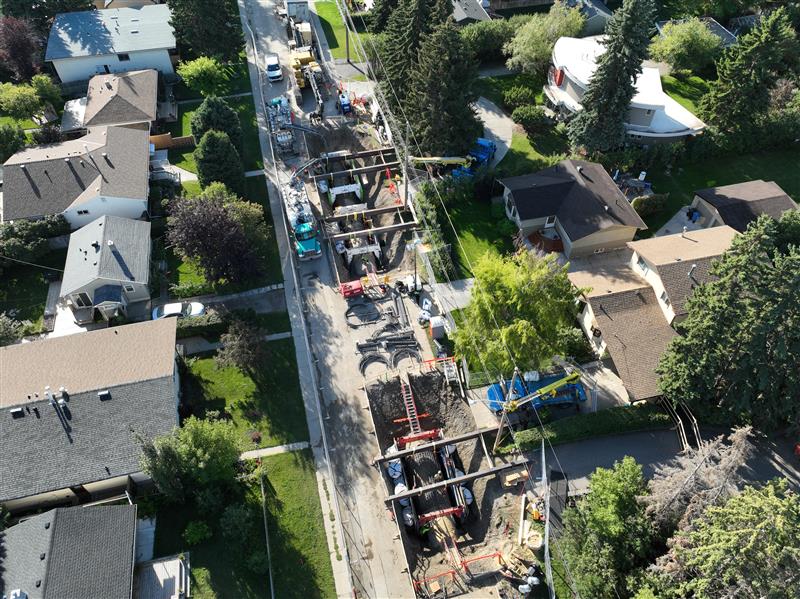Doctors advise adding COVID-19 to your list of vaccines this cold and flu season
Posted Sep 27, 2024 6:12 pm.
With COVID-19 now largely considered endemic, doctors say it is advisable to add the latest available vaccine for the virus to your yearly flu shot schedule.
“COVID is not going to go anywhere anytime soon and we know COVID circulates all year round, but we know there’s more of it during the fall and the winter seasons,” says infectious disease specialist Dr. Isaac Bogoch.
Since the virus mutates rapidly, new variants regularly emerge and vaccines need to be adjusted accordingly.
“COVID is constantly changing and so we have to start updating the vaccine to what the main circulating strains are,” explains Dr. Anna Banerji, a pediatrician and infectious disease specialist.
New COVID-19 vaccines
The COVID-19 vaccines currently available are optimized for the XBB 1.5 mutation of the Omicron strain that emerged last year. New variants named KP.2 and JN.1 have since emerged.
The three vaccines that have been authorized for the fall season have been modified to combat these new variants.
“There’s always a delay [between a new variant emerging and a new vaccine] because it takes a while to develop the new types of vaccines. But this is a better match to what is circulating now than what there was before,” says Banerji.
The Pfizer-BioNTech Comirnaty and Moderna Spikevax vaccines are mRNA based, targeting KP.2 while the Novavax Nuvaxovid shot is protein-based and targets JN.1.
Moderna Spikevax is for those six months and older. Pfizer-BioNTech Comirnaty and Novavax Nuvaxovid are for those 12 years of age and over.
Bogoch says it’s best to take whichever vaccine is available to you.
“The goal here is obviously to reduce the risk of severe manifestations like hospitalization and death. All of the vaccines that are available will help accomplish that goal,” he says.
Banerji says while there are no longer reports of mass COVID casualties as there were during the height of the pandemic, it is still vital to get vaccinated.
“I think the majority of us have some degree of immunity where we’ve had several vaccines. Plus most of us have had COVID at some point in time and so we have some partial immunity,” she says.
“The vaccines help boost up that immunity, make sure that you don’t get as sick. It reduces the chance of you getting it, but if you do get it, you’re not as sick and you’re not spreading it as much to other people. If you don’t get it, you can’t really spread it.”
If you have been previously vaccinated, it is recommended to take your next shot six months later, but a minimum interval of three months may be used. If you’ve recently had a case of COVID-19, the same intervals apply from the time you had the infection to the time of your next vaccine dose.
Click here for more on vaccine schedules and when to get vaccinated.
Who should get immunized?
“When we look at the National Advisory Committee on Immunization’s (NACI) recommendations, they actually use different words – ‘should’ and ‘may,'” Bogoch explains.
“People who should be getting their vaccines are people over the age of 65, people with underlying medical conditions that put them at greater risk for severe infection. People who live in congregate care settings like long-term care facilities or elder lodges, Indigenous communities.”
People who are pregnant, those from racialized and other equity-deserving communities and those who provide essential services also fall under the “should get vaccinated” category.
“Everybody else [six months and older] may get the vaccine, and that means you can get the vaccine. Some people are going to be certainly marching toward the pharmacy or their family physician’s office to get the vaccine where it becomes available. Other people might have additional questions or concerns that they want ironed out before they get this.”
For those who do not have a family doctor, a variety of healthcare providers including pharmacists and nurse practitioners can provide information and answer questions to help make a decision about getting vaccinated.
RSV is also in season
Both Bogoch and Banerji warn that Respiratory Syncytial Virus (RSV) also tends to surge in the fall and winter.
“RSV is really the number one reason for babies to be hospitalized around the world … the younger you are, the more likely you are to have severe disease. But also, if you’re Indigenous in certain communities — like I’ve been studying Inuit babies for almost 30 years — they have multiple risk factors for having very severe RSV,” says Banerji.
For infants, RSV protection comes in the form of monoclonal antibody preparations – nirsevimab and palivizumab.
For pregnant mothers, the RSVpreF vaccine Abrysvo is recommended.
“So what happens there is you give the vaccine, the mom produces antibodies and those antibodies are transferred to the baby before the baby’s born. And so the baby’s born with some immunity,” explains Banerji.
Like the flu, RSV can also be more severe for older adults and two vaccines are available – RSVPreF3 (Arexvy) and RSVpreF (Abrysvo).
“The National Advisory Committee on Immunization recommends that people over the age of 75, especially those with risk factors for severe infection, get this RSV vaccine because RSV can behave like the flu, can pack a punch, and sadly older individuals can end up in hospital — it’s a nasty virus,” says Bogoch.
He adds that some Canadians have already received the vaccine and it appears to have a longer timeframe of efficacy.
“It looks like it lasts for about two years, maybe even a bit longer as well,” he says.
Click here to learn more about RSV and how to protect yourself.








